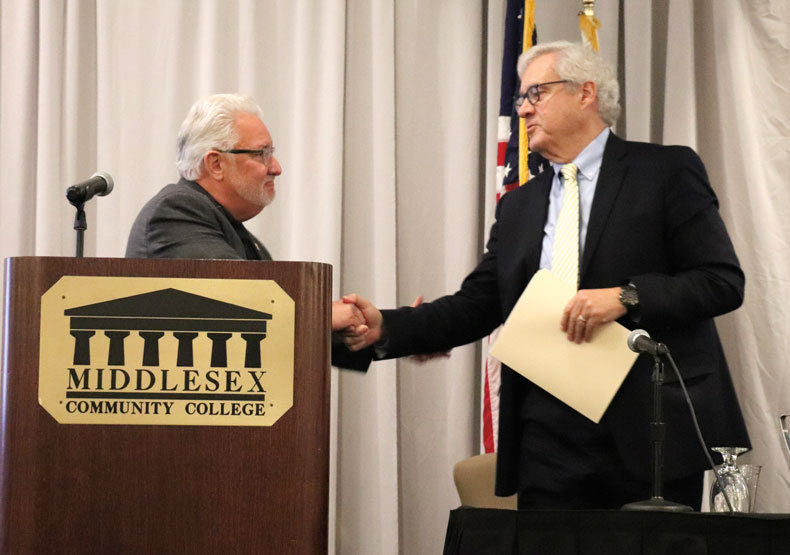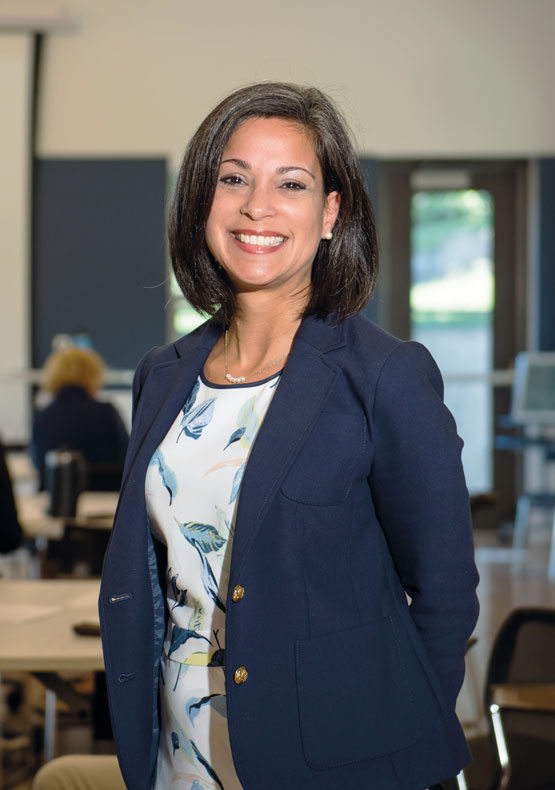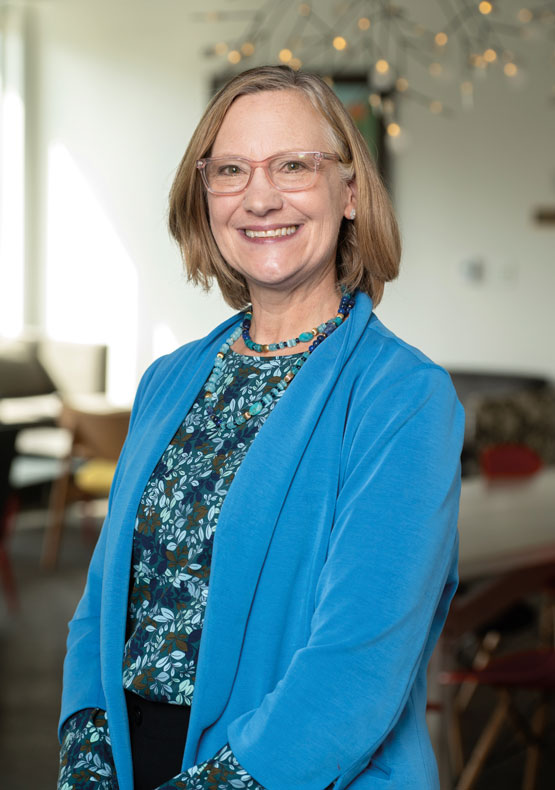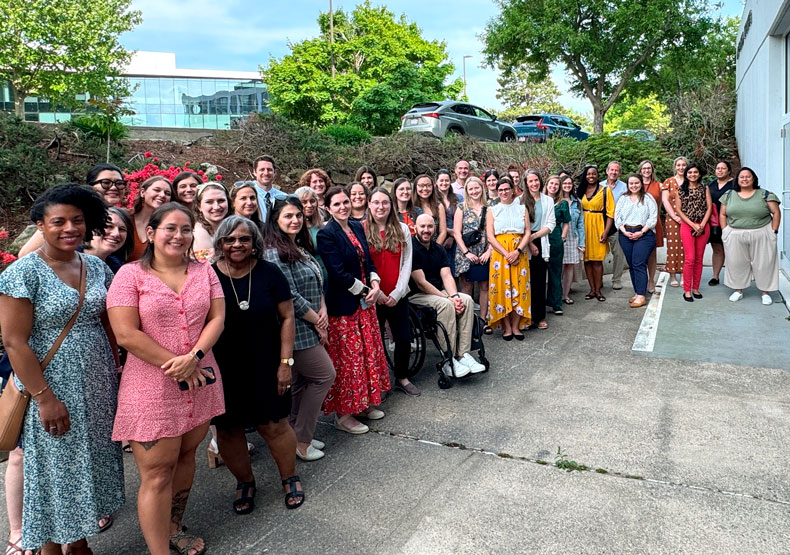Partnering for Success: The Power of Combined Knowledge and Resources within our Communities

Middlesex Community College President, Dr. Philip J. Sisson (left) with President Nicholas Covino, PsyD of William James College (right).
Engaging the community at large has been woven into the fabric of William James College from the beginning. Since 1974, we have brought awareness of higher education to the gamut of organizations—from field placement sites and State government and now to police departments and K-12 schools. In turn, community needs are constantly informing our curriculum and impacting strategic growth, the result of which has been a strong sense of reciprocity: The work unfolding in our classrooms informs how students show up in the community, at field sites and as alumni with thriving careers, while community needs communicate those skills people need to be successful in the workplace, including how they access higher education. A nimble approach to innovation, amidst an evolving social and educational landscape, has positioned William James College to meet the needs of a diverse range of individuals within the community.
Read on for a trio of faculty members who have been instrumental in creating and maintaining these meaningful bonds.
 Nadja N. Lopez, PhD, Executive Director, Behavioral Health, Equity, and Leadership in Schools (BHELS)
Nadja N. Lopez, PhD, Executive Director, Behavioral Health, Equity, and Leadership in Schools (BHELS)
Empowering educators and school leaders to use the resources they have to create positive learning environments for students is what makes Nadja N. Lopez, PhD, tick. As Executive Director of the Center for Behavioral Health, Equity, and Leadership in Schools (BHELS), she’s been tasked with engaging stakeholders in the K-12 education community to contemplate how changing mindsets and behaviors—coupled with learning new skills—translate to supporting today’s youth in a proactive, preventive way.
“Educators are struggling when it comes to understanding the best way to provide strong, safe, supportive classrooms that promote positive mental health,” says Lopez, who is hoping to effect long-term change in this arena. The “Leading Transformative Mental Health in Schools” program takes a team approach to addressing the increased behavioral and emotional dysregulation of students. The program, comprised of components for teachers, administrators, and systems, provides districts the tools and support needed to improve school culture, educational outcomes, and well-being for students and adults; at present, 23 classroom teachers from five districts are engaged in this strength-based approach aimed at helping K-12 educators create supportive environments for their students.
“When we work with teachers to prioritize their own wellness, they become empowered to pass this learning onto their students,” says Lopez of what she calls a funnel approach to the work—one that, with limited mental health professionals doing one-on-one therapy, is as valuable as ever.
“Engaging the community is a critical approach,” says Lopez, underscoring the power of combined knowledge and folks working together insofar as catching things early and reducing stigma.
 Kerri Augusto, PhD, Director, Undergraduate Studies
Kerri Augusto, PhD, Director, Undergraduate Studies
Meeting the ongoing needs of students who hail from the community at large is of paramount importance to Kerri Augusto, PhD. In her role as Director of Undergraduate Studies, she is committed to helping a diverse range of adult learners give back by turning their passion for psychology and human services into fulfilling careers.
“Our bachelor’s program is a microcosm of the surrounding communities,” says Augusto, underscoring the large number of students who find their way to Newton from community colleges across the Commonwealth, spanning Berkshire and Quinsigamond to North Shore. Three years ago, when tasked with revamping the curriculum, Augusto set her sights on outcomes.
“Students want to have a voice at the table which, despite being immersed in their local community and understanding needs from the inside out, requires having a degree following their name,” says Augusto of the most common refrain heard among undergraduates.
Once credentialed, these voices are being amplified in various ways including workforce development programs like the Behavioral Health Services Corps which—in addition to hands-on experience, a salary, and credit toward a master's degree—comes with the added benefit of mentorship.
“These [post-baccalaureate] opportunities increase student confidence and empower them to envision having a bigger role in the work they are already doing,” says Augusto of the intention steeped within the curriculum, one aimed at creating a pipeline for career ladder opportunities. Among last year’s graduates, 73% went on to pursue more education; the remainder went to work, pursuing interests in influencing public policy. A fully online program, launched over the summer, came in response to adult learners’ request for even more freedom and flexibility than the blended program afforded.
“Simultaneously putting our students out into their local communities while understanding them as a unique community of adult-learners themselves has been key,” says Augusto of a unique trajectory at William James College that now includes bachelors and masters to doctoral-level training and education.
Angela Wilbur, PsyD, Director of Training, Clinical Psychology Department
The concept of coming full circle is particularly resonant with Angela Wilbur, PsyD, an alumna who was able to take what she learned in the field, bring it back to campus, and advance training to the next level. Wilbur, a 2006 graduate of the PsyD in Clinical Psychology program, did her postdoc training at Lynn Community Health Center (LCHC) under the supervision of founder, Director of Training, and William James College graduate Dr. Stephen D. Hayes.
“I got to shadow a legend who helped to cultivate my passion for training the next generation of future psychologists,” says Wilbur who stayed on at LCHC following her licensure; in keeping with her mentor’s wishes, she was named Director of Training.
In 2014, Wilbur was part of the initial accreditation process for the American Psychological Association Internship Consortium at William James College—a program she now oversees.
As Consortium Director, engaging the community at large is vital to her daily work. She collaborates with more than a dozen different sites—spanning hospitals and assessment centers to college counseling programs and private practice—to place students in their final phase of training prior to earning their doctorate. Since the Consortium’s inception, more than 350 total interns have been trained at sites throughout greater Boston and New England.
“It’s incredibly gratifying to have been a student, a trainee, a supervisor, a director at one of the inaugural Consortium sites, and now to serve as Director of the entire APA Consortium,” says Wilbur who cites a loyal group of like-minded directors whose commitment makes preparing the next generation possible.
“In the end, it’s a win-win,” says Wilbur of engaging community partners in the vital work of training the future psychologists. “We’re seeing the full circle as our graduates meet the needs of underserved populations, provide the treatment and assessment so desperately needed, and continue the legacy,” says Wilbur, underscoring a simple truth: None of this work would be possible without engaging the community beyond William James College and the confines of its campus.
This vital and ongoing work of engaging the community is best summed up by Lopez: “The responsibility to promote daily mental health practices lies with each of us.”

Angela Wilbur, PsyD with Field Supervisors, Directors of Training, and Clinical Psychology PsyD Internship Graduates at the 2024 APA Consortium Graduation.
- Tags:
- In the Community
Topics/Tags
Follow William James College
Media Contact
- Katie O'Hare
- Senior Director of Marketing
- katie_ohare@williamjames.edu
- 617-564-9389
